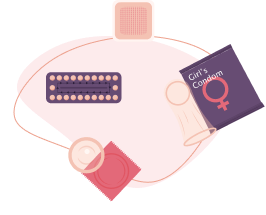
Abstinence
Abstinence is choosing not to have sex.How the method works
- If two people don’t have sex, sperm can’t fertilize an egg and there’s no possibility of pregnancy.
Effectiveness
- If the sexual partners practice total abstinence, it is 100% effective in pregnancy prevention.
Advantages
- It is 100% effective when practiced consistently and also prevents STIs.


Limitations
- It may be difficult to put it in practice especially when both partners are sexualy active.

Juu life ni kujipanga!
Popular questions
You will get a small injection on your arm to numb you. This means you won’t feel pain at all during insertion. There will be a little pain or soreness as the wound heals for about a week.
Yes. A woman who has not had children generally can use an IUD, but she should understand that the IUD is more likely to come out because her uterus may be smaller than the uterus of a woman who has given birth.
Yes. If needed, ECPs can be taken again, even in the same cycle. A woman who needs ECPs often may want to consider a longer-acting and more effective family planning method
Yes. A woman who has not had children generally can use an IUD, but she should understand that the IUD is more likely to come out because her uterus may be smaller than the uterus of a woman who has given birth.
No. Most research finds no major changes in bleeding patterns after female sterilization. If a woman was using a hormonal method or IUD before sterilization, her bleeding pattern will return to the way it was before she used these methods



